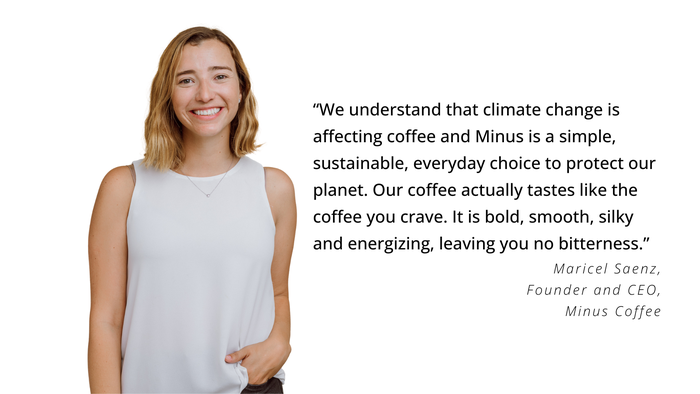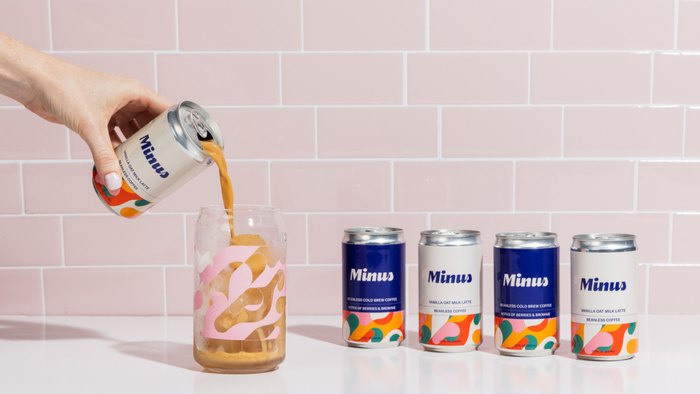Bean-free coffee from Minus supports environmental sustainability
Founder Maricel Saenz set out to reduce coffee’s environmental footprint while pleasing consumers who support sustainable living. Find out more.

At a Glance
- Instead of beans, Minus Coffee roasts upcycled ingredients such as roots, seeds and legumes, then adds caffeine.
- Minus Coffee employed coffee industry experts and blind consumer tastings to ensure the product would have the proper taste.
Minus Coffee has a mission to inspire change for people obsessed with coffee and the planet.
The San Francisco, California-based company produces coffee without coffee beans—and with less water, lower carbon emissions, shorter supply chains and a greater focus on sustainability.
“Minus Coffee is the brew of choice for modern-day consumers who are early adopters and always on the hunt for something new,” said Maricel Saenz, founder and CEO of the company. “Our consumers are the ones who are eager to make daily choices that align with sustainable living, without compromising on taste or quality. They are the trailblazers who appreciate innovative alternatives and are not afraid to venture beyond traditional options.”

Life in Costa Rica inspires a new approach
Saenz grew up in Costa Rica, a noted coffee mecca, and saw the importance coffee was to people’s everyday routine. But she also saw the challenges coffee production created for farmers and the environment.
Saenz began working to find out if it was possible to ensure a future where coffee remains accessible while adapting to climate conditions. She learned that using fermentation, crop substitutes and “a perfect team of coffee geeks,” the coffee industry could change for the better.
“We understand that climate change is affecting coffee and Minus is a simple, sustainable, everyday choice to protect our planet,” she said. “Our coffee actually tastes like the coffee you crave. It is bold, smooth, silky and energizing, leaving you no bitterness.”
After all, Saenz and her team want coffee drinkers to continue savoring their favorite beverage. They just want that to happen in an environmentally friendly way.

Minus’ beanless coffee emits 86% less carbon emissions than traditional coffee, uses 94% less water and utilizes 92% less land, according to a comprehensive Life Cycle Assessment on the RTD coffee.
Upcycled ingredients give coffee a green start
“When we envisioned our finished product, we always wanted sustainability and taste to be the key drivers for it,” Saenz said. “During our R&D process, we built a library of over 150 ingredients. We tested different formulations to ensure we achieved the perfect combination.”
In 2020, the company used precision fermentation to create yeasts that recreate coffee compounds for hot and cold brews. Instead of beans, Minus roasts upcycled ingredients such as roots, seeds and legumes, which are then ground and brewed with caffeine.
This process involved not only matching the chemical compounds found in coffee, but ensuring the mix of ingredients would create a smaller environmental footprint than traditional coffee.
“We thoroughly studied the origins of each ingredient—from growing to manufacturing, transportation, use and disposal,” Saenz said. “Once we had finalized our formulation, we conducted a comprehensive Life Cycle Assessment of our finished product, which uses 41% upcycled ingredients (date seeds and grape seeds).”
The results were staggering: Minus’ beanless coffee emits 86% less carbon emissions than traditional coffee, uses 94% less water and utilizes 92% less land.
“Our findings confirm that our careful selection and testing of ingredients not only achieved the desired taste but also significantly reduced the environmental impact,” Saenz said.
Obviously, much trial and error preceded the successful product. After all, innovation naturally comes with its fair share of challenges. Recreating coffee is extremely complicated.
“In coffee, there are hundreds of different chemical compounds that make the beverage we love unique,” Saenz said. “Thus, recreating those chemical compounds in other ingredients through our fermentation process was the challenge. To ensure we were on the right track, we established a robust feedback loop that involved coffee industry experts and blind consumer tastings. This comprehensive approach allowed us to refine our product until we were confident it was ready for the market.”
Incubator support, NEXTY Award raises profile
Earlier this year, Minus Coffee won a Editor’s Choice NEXTY Award at Natural Products Expo West. The brand exhibited with LA Libations’ SoCal Incubation (SIP) program.
“This program is a beverage incubator and accelerator focused on innovative, better-for-you brands. It involves a 12-month process where we prove our brand’s velocity story in the California market by leveraging LA Libations’ deep relationships and expertise in the industry,” Saenz said. “The SIP team feels like an extension of our own, and they care for our success as if it were their own. This support has been invaluable as we navigate the challenges and opportunities of bringing our product to market.”
Winning the NEXTY Award has helped Minus increase its visibility within the industry. “This prestigious recognition has helped us gain traction with key players in the retail sector, from retailers to distributors,” Saenz said.
Minus Coffee started commercializing its 7.5-ounce cans in numerous independent stores in Los Angeles and San Francisco, California. The company has also been working with foodservice partners to bring the product to mission-driven, sustainability-focused companies.
“We are laser-focused on growth and expansion as we look to broaden our market reach,” Saenz said. “As part of our growth strategy, we are eager to extend our innovative and sustainable approach to other product categories.”
About the Author
You May Also Like

.jpg?width=700&auto=webp&quality=80&disable=upscale)
